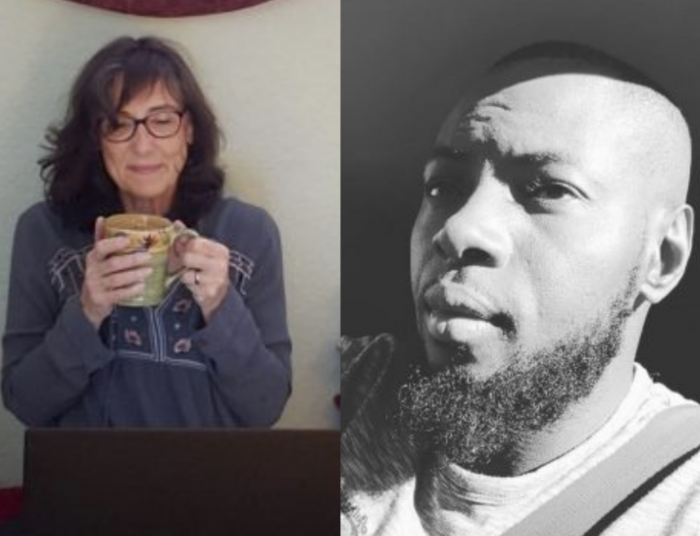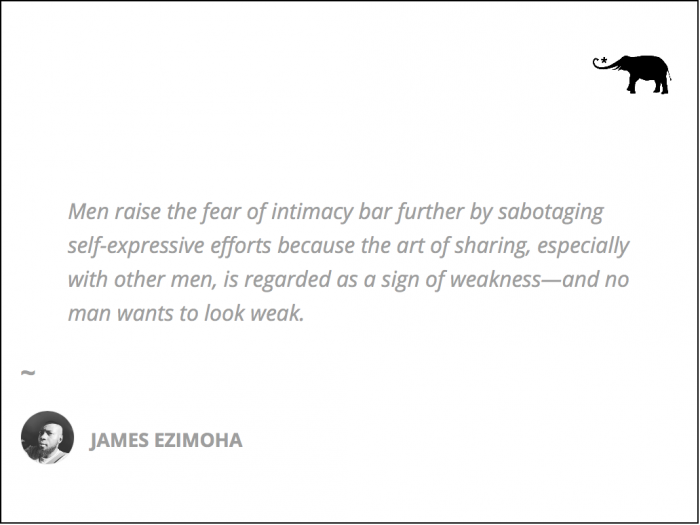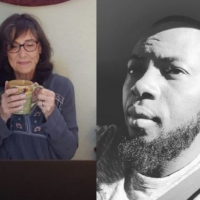James and “Mama K” engage in a conversation about men.
Two generations. Two different continents.
She says: “Hello James, my friend. I really enjoyed our conversation about women’s empowerment. I wonder if you would indulge me in a little chat about men.”
He says: “It is an interesting time in human history to be a man, Mama K.
A thunderous call for change is sweeping across the world, underlined by a powerful movement centered on what it truly means to be a man. We are unlearning, healing, and on the verge of a significant shift—a victory for humankind.
What exactly would you like to talk about?”
And she replies: “I have always observed that men, in general, don’t seem to develop close relationships with other men like women do. Can we talk about that?”
“This conversation is one that I have been itching to have for some time. Yes, we can.”
“I have always had a tribe of sisters I feel emotionally close to, James. At times, one or two women, at other times, half dozen with whom I’ve made a deep connection. Whether one-on-one or in a small circle of sisters, we share our hearts, our guts, have soul-stirring conversations that bring us to tears or lift us to joy. We share our missteps and our victories, our wildest passions, and our deepest grief. We share our stories. We push through our fear of being vulnerable. There is a sense of intimacy and trust that develops.
Of course, it takes time and tending to establish these relationships but once established, they are solid.
My observation of men is that they have circles of friends that revolve around work or sports, possibly even child-raising, but their conversations, their connections, stay at the surface level. I don’t know many men who have truly deep, emotional relationships with other men.
Even my own husband took years to develop a couple of semi-intimate friendships with men. Most of his besties were my girlfriends. He found it easier to join in and express his vulnerable side with women. But showing an authentic emotional side to other men? Never.”
“This dysfunctional sense of intimacy you speak of is a real concern amongst men, Mama K.
I have always wrestled with sharing my deepest, most vulnerable thoughts and experiences with other men.
Talking to men feels like a communication hazard—a risk most men aren’t willing to take. Because we struggle to hold space and show empathy, which are crucial for vulnerability, having a heart-to-heart or forming a “circle of brothers” feels super awkward for every man involved.”
“I see your point, James. How do men support each other without the required emotional tools?”
“You can’t give what you don’t have, Mama K. In my article on toxic masculinity, I painted a picture of how (and why) men fluff their lines when they attempt emotional expressions like compassion and empathy.
Convincing ourselves that other men are probably dealing with issues twice the size of ours, and therefore shouldn’t be burdened with more, is a bro code of shame we’ve all adopted.
We highlight this self-righteous, guilt-blocking, egotistic narrative to mask our fear of intimacy with other men.”
“Wow! Self-righteous, guilt-blocking, egotistical? This is a strong calling out, James. Go on.”
“As a child who had a mouth full of questions, getting answers from my dad often felt like navigating an aircraft through the eye of a storm. It was doable but at the risk of being struck by lightning.
A lot of the conversations I instigated with my dad ended with five little words: “Go and ask your mother.” These words crippled my fledging curiosity one too many times, creating an unnatural barrier between boy and man—between father and son.
I took his advice and went to my mother.
Women are like oak trees—there’s always love to give. A mother’s bosom is warm and accommodating, so I took refuge. I held on to that connection and secured what has now become a familiar line of communication with women.
Deprived of healthy masculine intimacy as boys, men often struggle to navigate soul-stirring conversations or develop deep emotional connections with other men. It is possible that our reluctance to pursue vulnerable relationships with other men stems from a dysfunctional and undeveloped sense of masculine intimacy from childhood.
Men raise the fear of intimacy bar further by sabotaging self-expressive efforts because the art of sharing, especially with other men, is regarded as a sign of weakness—and no man wants to look weak. It’s all in the playbook.”
“Such good observations, James.
I can relate to a lack of intimacy with my father. He was only in my life until I was about 11, but ‘Go ask your mother’ was a familiar phrase in our house too.
Now that I reflect on this, I can see that it stunted my own ability to be open and vulnerable with men. I didn’t know how because I had no experience with my own father and, in fact, was taught to operate from the 50s woman’s playbook – just be pretty, compliant, and make nice for men. It wasn’t until I was in my mid-40s that I finally took those scary steps of emotional intimacy with my husband.
We logged about 10 years in our marriage before we finally started to communicate honestly. But, I have to tell you, it was me who dragged him kicking and screaming into intimacy. He would have rather run to his man cave du jour to escape the torture of exposing his emotions. He’s still not always readily available for some of the hard conversations.
So maybe the genesis of this intimacy wound is an emotionally unavailable father, and the unavailable father is the product of good old-fashioned patriarchy.
As you pointed out earlier, men don’t want to appear weak. Men want to be in the power position. A man can’t accommodate his own sense of power if he is behaving like a woman.
There’s also the issue of how we each define intimacy. From a man’s perspective, I think intimacy might be viewed as naked bodies having sex. Period. Or maybe we add those moments when a man feels strong and protective of his woman when she is being vulnerable.
But for a woman, intimacy is so much more than sex. Intimacy comes in revealing the depths of who we are to one another. Feeling all the feels together, naming the fears, letting the tears flow.
One of the biggest turn-ons for most women I know is when a man lets us in. We’re really tired of all this emotional armor. And honestly, we see right through it anyway. We’re pretty intuitive. We know when you’re hurting, so let us the f*ck in already!”
“I am actually laughing because a female friend once told me that she could see through my BS—I had only known her for a couple of weeks. I rebuffed her claim, but her intuition was spot-on.
Like you said, this behavioral malaise points to patriarchy and the doctrines enshrined in the patriarchal system hurt girls and boys, men and women.
Boys need to be exposed to healthy masculine intimacy to break the cycle of this wounding. Period! You cannot simulate the interaction or connection between a boy and a man; neither can you replace it. Boys come into this world connected, through the umbilical cord and the breast, to their mothers, which makes latching on to feminine connection effortless. Men need to invest twice the time and effort to connect with boys.
Fathers must learn to listen, hold space, and show empathy. Men must set good examples for boys by embracing self-expression, developing deep, emotional relationships with other men, and letting others into our fortified palace of shame.
The only way this works is if men acknowledge and connect with the boy in themselves. You cannot navigate deep, emotional conversations when the playful, exuberant, and inquisitive version of yourself is trapped and wounded.
We must encourage men to talk openly and unashamedly with one another today because this role-modeling will determine the caliber of men that boys will become tomorrow.”
“I think we could go on for days, James, but it’s time to give our readers a pause to ponder our musings.
In closing, I want to circle back to something you said as we started this conversation:
‘We (men) are unlearning, healing, and on the verge of a significant shift—a victory for humankind.’
I hope this is true, my friend. It gives me hope.”
~


 Share on bsky
Share on bsky






Read 30 comments and reply